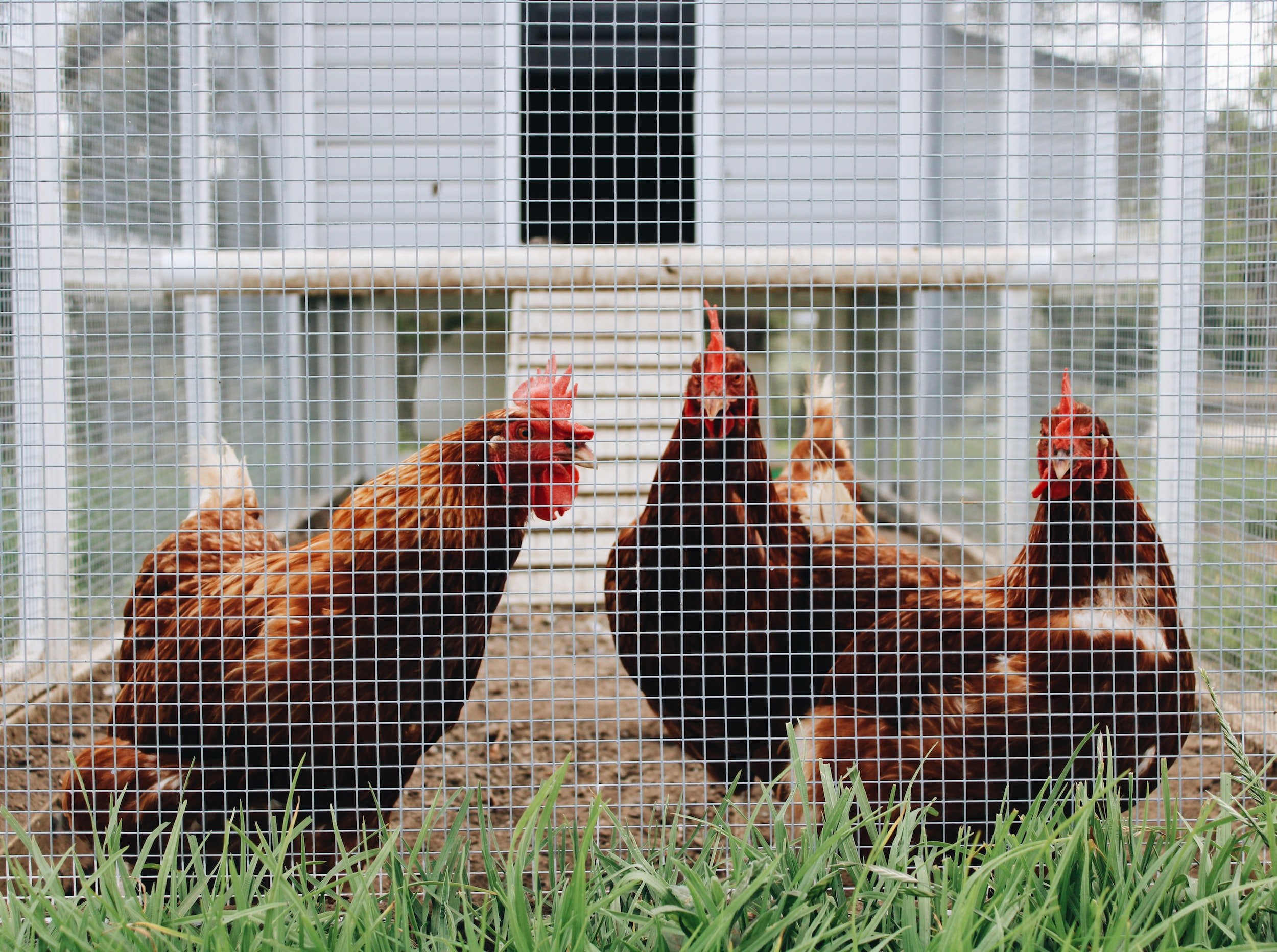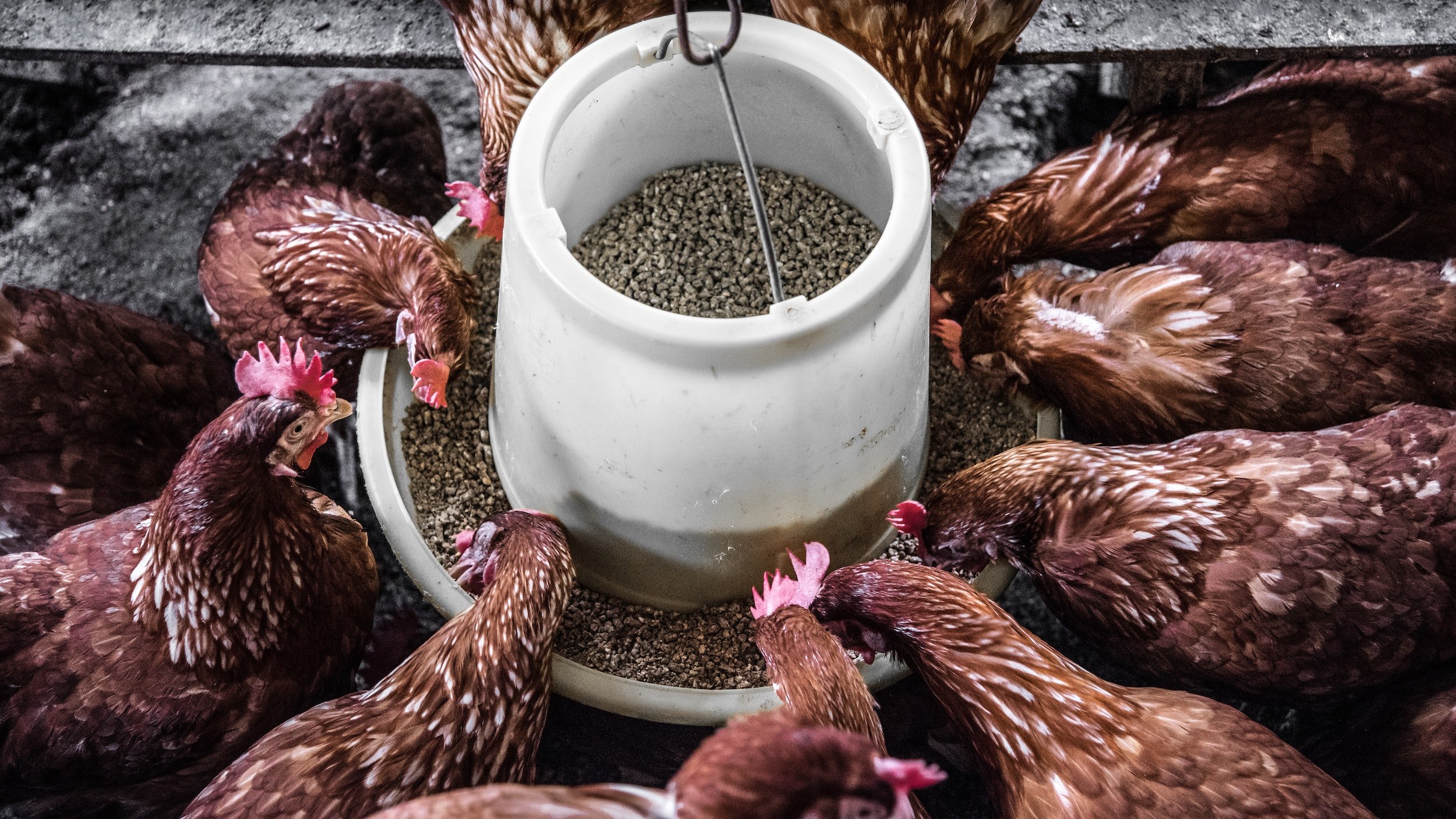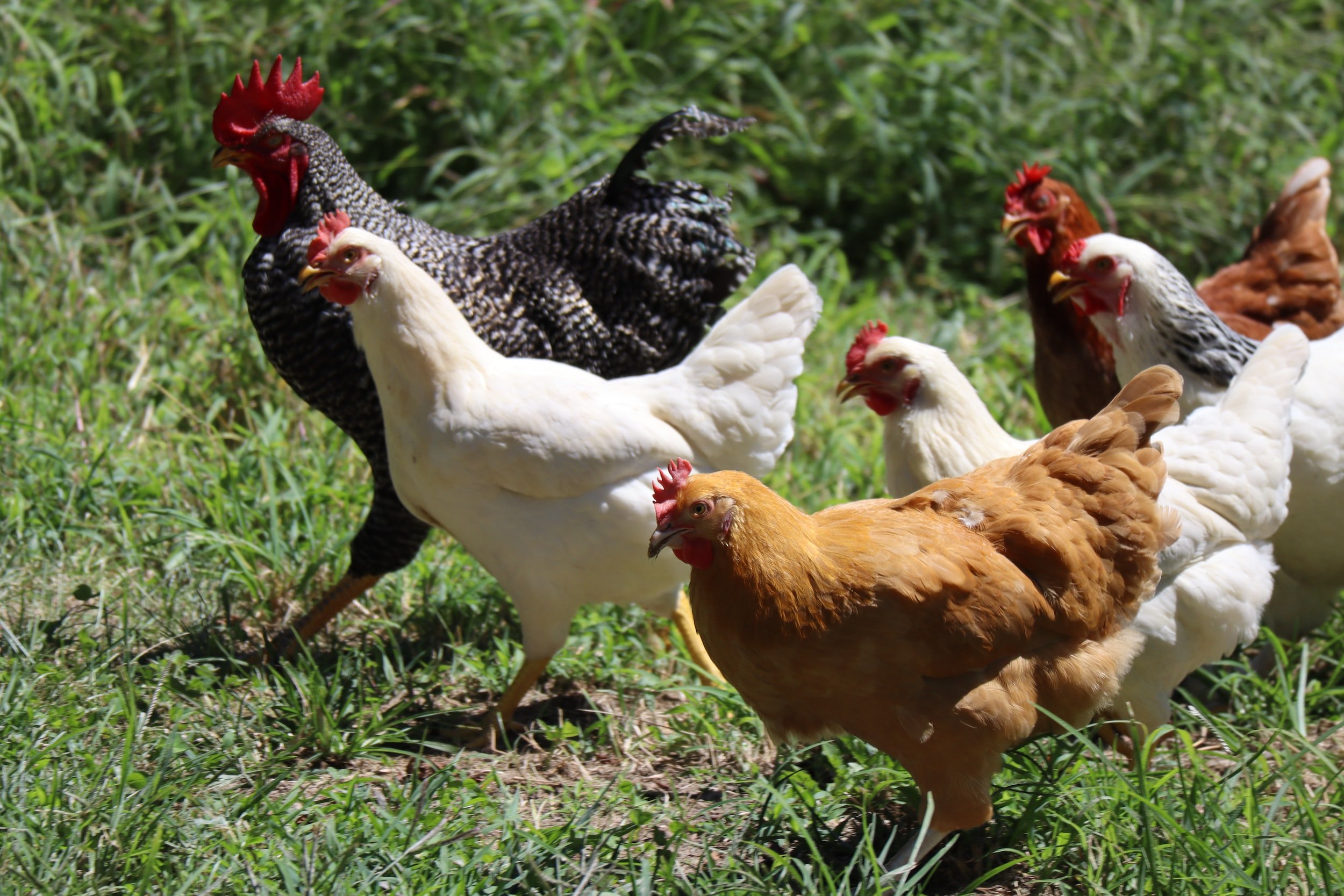The Ultimate Guide to Keeping Predators Away From Your Chickens
Here’s a confession to those of you that choose to read this blog, and I hope I don’t offend you.
At the same time, I need to be upfront.
I don’t really like chickens all that much.
I like what chickens do. I like how they convert boring old grass into delicious fresh eggs, and I love nothing more than a slow roasted chicken breast.
However, chickens, as a species, aren’t my favorite animal. I find that they’re cranky, finicky, opportunistic, and, frankly, downright mean sometimes.
Which is why I always had a more lackadaisical approach to raising chickens.
Now I understand that there are some people who would rather die than let anything happen to their chickens. I’m not one of those people, but I do believe in protecting my flock from anything that may befall them. After all the work we’ve invested into raising a healthy, happy flock, I’m not about to lose a bird to any kind of outside invaders.
We never had predator problems until last summer. I firmly believe that it was our choice to start a flock of guinea fowl that invited in our predator issues.
At some other point and time, I’ll write an article about raising guinea fowl. I know that they have a place on MANY homesteads, but unfortunately, our property just isn’t one of them.
They didn’t really put a dent in our tick population. Instead of spending their days foraging, as we had hoped, they spent pretty much all of their free time screaming their heads off.
Granted, we knew that this is what guineas are designed to do. However, because guineas scream their heads off at...well...everything ...it was difficult for us to know what was a real threat and what was literally nothing.
Unfortunately, we had also read that guineas were aggressive and would chase off any predator that came near the rest of the chickens.
Whether we raised our guineas incorrectly or just got unlucky, I don’t know. But what I do know is that this definitely was not the case - our guineas were a bunch of big babies and would just run around in circles and - you guessed it - scream when they were scared.
Not helpful.
By the time we figured it out, the screaming guineas managed to attract a bevy of curious carnivores to our property. Namely, foxes and hawks.
We lost 25 of our meat chickens last summer, when we were still allowing them to free range and before we implemented a chicken tractoring system. Now, we don’t lose any birds - but it took us a LONG time and a LOT of trial and error to finally get our birds protected.
For the record, we lost 11 out of 12 guineas to that fox I mentioned, too. So much for that.
Part of homesteading is being aware of your limitations, but even more importantly, it’s about being willing to learn. Our predator problems, as devastating and horrible as they were, taught us a lot about how to deal with predators on the farm.
Here are my best tips for keeping predators away from your chickens. Hopefully, you’ll be able to apply some (or all!) of these to your own farm - even if you have a type of livestock besides chickens.
Without further ado…
**J&R Pierce Family Farm is a participant in the Amazon Services LLC Associates Program, an affiliate advertising program designed to allow sites to earn advertising fees by linking to products on Amazon. I often link to Amazon when recommending certain products, and if you choose to purchase, I may earn a small percentage of the sale. It costs you nothing extra, and all recommended products are ones that I personally vouch for. **
What Animal Kills Chickens at Night?
Here are some of the predators you might find going after your chickens, as well as links so that you can figure out the most likely culprit.
Raccoons - Signs
Foxes - Signs
Hawks - Signs
Owls - Signs
Coyotes - Signs
Possums - Signs
Weasels - Signs
Domestic Dogs - Signs
Domestic Cats - Signs
Bobcats - Signs
Fishers - Signs
Remember that some predators will vary their behaviors and predation techniques depending on the season. For example, many flying predators migrate in the spring and fall. If your chicken run is located within a natural flyway, you might notice greater predation during those periods.
If you still aren’t sure what might be going after your birds, consider setting up a trail camera to investigate. It beats staying awake all night to figure it out on your own!
Here’s a video with more information about figuring this out:
Lock ‘Em Up
I know, chicken jail doesn’t sound very fun. But it’s important. You need to make sure your chickens are secure at night, and you need to make sure that they are locked into a coop that can’t be opened by intelligent animals. Raccoons quickly teach himself how to open locks and bolts.
Make sure the door is secure, and even more importantly, before you shut the door, make sure all of your birds are inside. If you have young pullets or birds that were just introduced to the flock, keep in mind it can take some time for them to get used to their new home. In the meantime, they might decide to sleep next to the coop, underneath the coop, under a tree, or anywhere else that is...not the coop.
Double check! Always. And count.
Going out to the chicken coop each night to shut the door can be a drag. Back when we first got chickens, my husband and I used to take turns doing this.
When he broke his leg, that made me the Chief Chicken Coop Inspector. This was not a role I liked, as it meant dragging my lazy butt out to the coop in the middle of the night, in the snow, and in the mud, to make sure my birds were secure.
Shortly after, we decided to invest in an Automatic Door by Chicken Guard.This invention is a LIFESAVER. I’m not one to push products, but if you have chickens, you need to invest in it. It makes keeping chickens so much easier, since you don’t need to be around to shut the door.
In other words, you can have a life...and still have chickens. If it’s the only thing you do, you need to go get one of these awesome contraptions.
If you rely on your own willpower and memory to go out and shut your coop door every night, do it just before dark. You want to wait long enough to ensure all your birds are inside, but wait until dusk, and you might find that owls become a problem for you.
Modify Your Run and Coop
There are countless types of predators that will attempt to- and often succeed at -dig underneath the run to get after your chickens. While many people assume that chicken wire will keep predators out, this is an erroneous belief. As the name implies, chicken wire only keeps in ...well...chickens. Therefore, you’re going to need to be a little more creative.
Use hardware mesh buried at least two feet deep around the run space. Three or four feet is even better. This will help prevent digging predators from gaining subterranean access to your birds. If you have your birds in a tractor and are finding digging to be a problem, you can do the same thing. Just keep in mind that the tractor will be more difficult to move if part of it is trenched into the ground.
You’ll also want to remember that chickens who stand on a wire floor for long periods of time can develop foot problems, like bumblefoot. You’ll want to check their feet regularly and try to limit the amount of time they have to spend on wire.
We employed a unique strategy (read: accidental strategy) when we built our chicken tractors. Well, mostly accidentally. Not totally. Our tractors utilize tin as partial ceilings and sides.
To deter digging predators, we made sure the sharp side of the tin was on the lower edge of the tractor - the edge that rests on the ground. Our very first week of using the tractor, we found blood and fox hair on the edge of the tin.
It hasn’t tried to dig since.
I’d call that a win!
Now, if you have an open coop or run, you’ll want to cover that, too, particularly if hawks are already a problem. This is more common in rural areas - suburban homesteaders don’t have to worry about it quite as much, although it still can be a problem - but can be avoided by covering your run and coop. If you don’t want to totally enclose your run, you can use a tarp or clear sheet of plastic to accomplish this.
Do Some Landscaping
Predators like to lurk in tall grass. If you have any shrubs, grasses, or large trees near the area in which you keep your chickens, get rid of them. All you are doing is securing habitat for these unwanted invaders.
Don’t Procrastinate on Repairs
I know, you keep saying you’ll fix that small hole in the floor of the chicken coop “eventually.” Well, let me tell you something. “I’ll do it tomorrow” very quickly turns into three years down the road, and you’re inviting a lot of predators to enjoy a tasty snack in your coop if you delay. Instead, get into the habit now of inspecting your coop regularly for any damages or holes.
Remember, predators don’t need a full-sized door in order to make their way into your chicken coop. All they need is about a ½ inch hole, in the case of rats and weasels. Make sure everything is secured as tightly as possible. If you find an opening, use ½ inch hardware cloth, which will be tough for your birds to pull open.
Watch Out For Egg Bandits
Humans aren’t the only species that enjoy snacking on eggs! If you’re sure that your own chickens aren’t to blame for some missing eggs, you might want to rule out other egg pilferers, like snakes or rats. These creatures are also known to occasionally chow down on small chicks, so you’ll want to get rid of them ASAP.
It’s also a good idea to start collecting eggs several times a day. The longer you leave eggs in your chicken coop, the more likely it is that they will become broken or attract a predator.
Clean Up Any Food
While allowing your chicken stock free range or giving them access to free-choice food is a great idea, as it can help them grow more quickly, you don’t want to leave food lying around longer than necessary. This is particularly true if it is spoiled.
Here’s the problem - food attracts hungry animals. From rats to coyotes, leftover food can attract just about any critter from the forest. Many of these usually won’t appear during the day, but if you happen to see one of these pests, like rats, during the day, you’ve got a big problem and need to deal with it immediately.
The better solution? Keep things clean, and prevent it altogether.
And don’t forget -compost is also considered food, so keep your bin far away from your chicken coop.
Be Present
As much as possible, spend time around your chicken run or coop. Many raptors won’t come out if they sense a human presence. The same rule applies to pets! If you have a dog that knows how to behave himself around your chickens, let him out with your birds during the day to ward off any potential predators.
Install a Fence
I know, we don’t like to keep our free range birds fenced. But you can build a really BIG fence! Most fences aren’t expensive or complicated to install, and they keep predators out while also keeping chickens in. This is a big bonus if you don’t want chickens to destroy your garden. Just keep in mind that you may need to clip their wings so they don’t hop over the fence.
If you want to provide your chickens with all the benefits of free ranging but you still want to keep them protected, consider installing an electric fence like this one. It can be moved every day and operates with solar power, so it’s a more eco-friendly option for keeping your birds safe and contained.
Remember that some predators, like dogs, bobcats, and coyotes, are superb jumpers. You will want to make sure your fence is well over four feet tall, as coyotes in particular can easily clear a four foot fence. It might be worth it to surround the top of the fence with barbed wire to deter these jumpers, too.
Construct Intelligent Shelters
If your entire chicken run consists of wide open field, you're going to have a problem with airborne predators. Give your chickens some place something under which they can take shelter.
Our coop is raised, so our chickens simply duck beneath it when the rooster lets out his warning cry. Raised coops in general are a good idea, as this will discourage skunks, snakes, or rats from building homes beneath it - or from making their way inside to go after eggs.
Use Reflective Materials
Consider hanging reflective materials in your run or coop area to help keep predators away. The shiny movement will startle predators, and while they’ll probably figure it out eventually, it’s a good temporary deterrent to creatures like raccoons and hawks.
Invest in Guardians
I already mentioned putting a trained dog in with your chickens. However, if you live in an area that allows roosters (if you’re raising chickens in the city, this may not be an option), you should definitely get one.
Roosters are noisy, but they can help warn hens to any impending danger. Some breeds of roosters will even round up the hens for you every night to make sure everyone is inside the coop!
Provide Nighttime Lighting
If you are having problems with nighttime predators, it may be worth your while to install motion sensor lights that will flood your run with light when a predator come by. It will keep nocturnal predators away, and it may let you get a glimpse of whatever creature is going after your birds.
Know Your Laws
It can be very tempting to...eliminate...a predator as soon as you see it in hot pursuit of your chickens. In some places, and for some species, this may be allowed. For others, not so much. If you think you have a predator problem, the first thing you need to do (besides identify the predator, of course) is determine which methods of dealing with it are legal in your area.
Be Flexible
Here’s the thing. Predators are smart, and it’s very easy for them to catch on to what you are doing. Don’t be afraid of mixing up your techniques every now and then. And don’t get discouraged if one tip doesn’t work. You need to be willing to experiment when it comes to preventing predators in your chicken yard.
So there you have it! Hopefully, with any luck, your predator problems will soon become a thing of the past by following these tips.
What other tips do you have for keeping predators away from your chickens? Be sure to let me know in the comments!
Want to learn more about raising chickens? Be sure to check out these articles!
Subscribe to our email newsletter for regular tips and tricks on homesteading and farming – wherever you are. You can also follow us on Instagram (@jrpiercefamilyfarm) and Pinterest (J&R Pierce Family Farm) for frequent updates. Happy homesteading!












